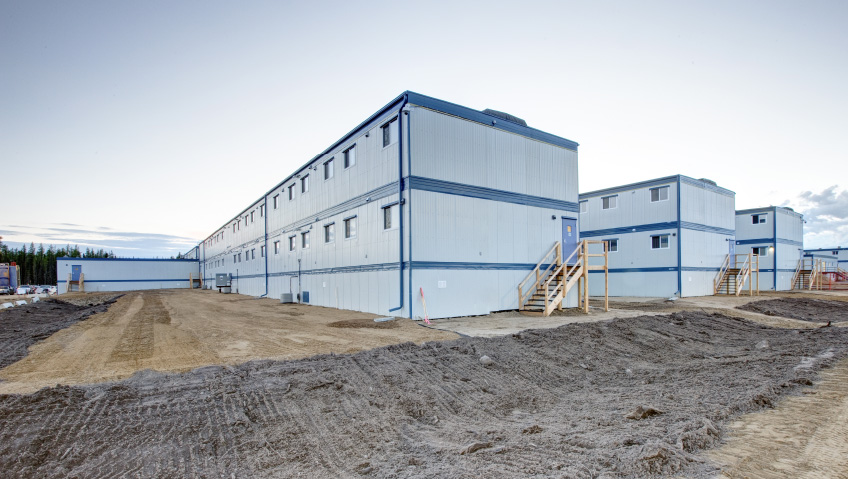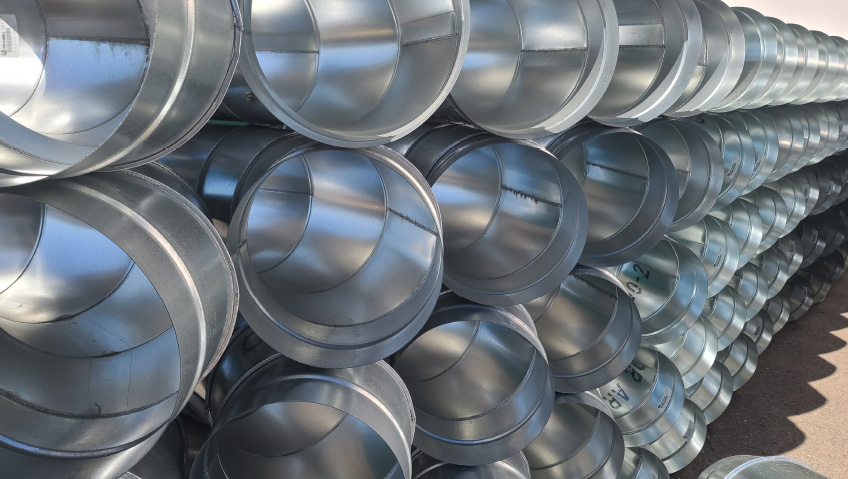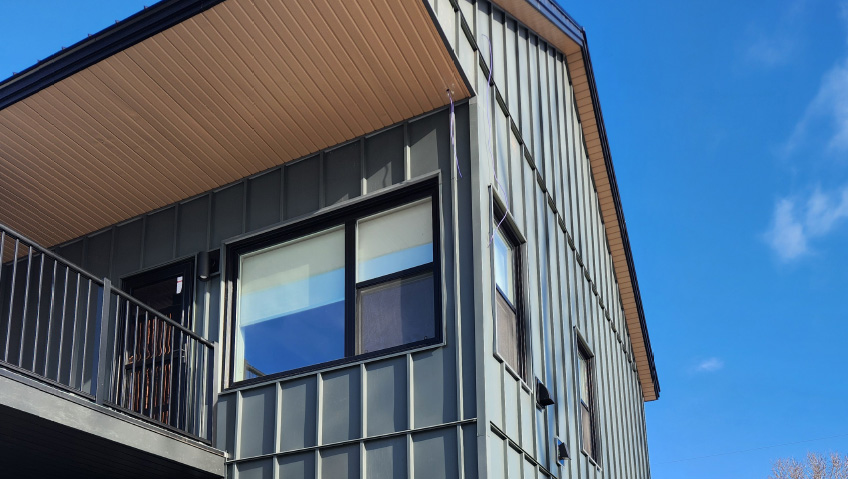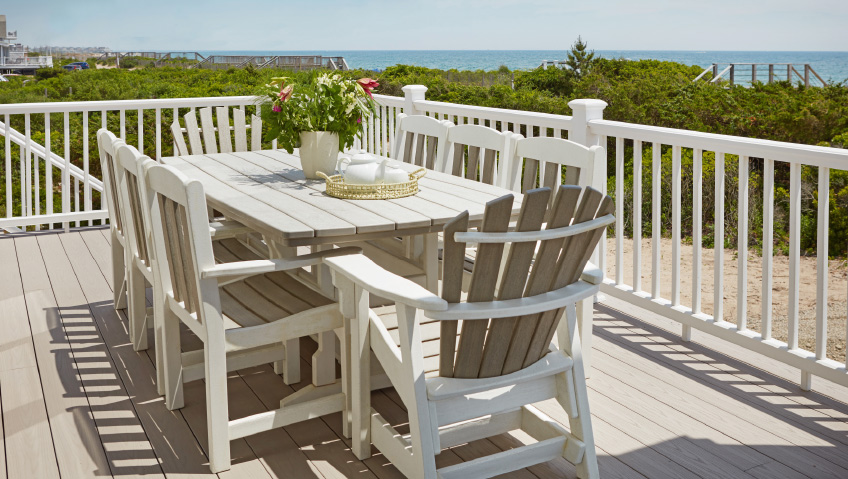When Northgate Industries celebrates its 55th anniversary this year, it does so not merely as a company that has endured, but as one that has continuously reinvented what modular construction can mean. From humble beginnings servicing RVs to becoming one of Canada’s leading modular manufacturers, Northgate’s evolution mirrors that of the entire industry: forward-thinking, design-driven, and redefining the future of sustainable building.
At the heart of this transformation is President Cheryl Watt, who carries forward the legacy of her father, Sid Braaksma, a Dutch immigrant whose entrepreneurial spirit laid the foundation for Northgate’s story. “My father emigrated from Holland in 1952 and was very entrepreneurial,” Watt recalls. “He started by renovating and servicing RV units, then began selling them. In 1970 he started the business in RV sale and service, then in 1973 he saw a need in the oil industry for modular structures, offices, and sleeping accommodations, and that’s where it all began.”
From that vision, Northgate Industries was born. What started as a small operation focused on recreational vehicles evolved into a dynamic modular construction business that would go on to serve energy, mining, forestry, housing, and commercial sectors across Canada and abroad.
The company’s early success came from recognizing opportunity where others saw limitations. As Alberta’s oil boom gained momentum, the demand for reliable workforce housing and site offices soared. Northgate met that need with modular structures that could be deployed quickly, withstand harsh conditions, and provide comfort in remote environments.
But even then, Sid Braaksma’s ambitions went beyond temporary structures. “He was always thinking ahead,” says Watt. “He moved from renovating to actually building the units himself, and that shift made all the difference.”
By the 1980s, Northgate had become one of Western Canada’s premier modular manufacturers. In 1987, the company acquired its largest manufacturing plant, on the south side of Edmonton, marking a turning point in its growth. Then came international expansion: in 1992, Northgate launched Kan-Bud, a sister company in Poland. By 1999, it had transformed a derelict World War II airplane hangar into a state-of-the-art, 213,000-square-foot manufacturing facility.
“That hangar was built in 1942 but structurally it was solid,” Watt explains. “Renovating it into a modern facility was a monumental moment for us.”
In 2010, the company acquired its current 240,000-square-foot headquarters in Acheson, strategically located to support Alberta’s thriving industrial sector. Today, that facility remains the centre of operations, housing a growing team of over 120 employees and counting. “We’re on the uptick,” Watt says. “We currently have around 120 employees, about 85 of them tradespeople, and we’re expecting to add another 60 as a major project is hitting the line this November.”
Throughout its 55-year journey, Northgate Industries has expanded far beyond its origins. The company’s work now spans rental fleets, workforce housing, affordable housing, multi-family developments, and commercial buildings, including offices and schools. Its 500-unit rental fleet provides flexible job site solutions for remote industries, while the company’s permanent modular projects are reshaping urban communities.
A prime example is Northgate’s collaboration with the City of Edmonton, where the company delivered five permanent affordable housing complexes in record time. “We built those five apartments for the City of Edmonton within a year, and that was during COVID,” Watt says proudly. “I’ve seen similar projects take two years for a single building.”
That accomplishment underscores one of the major advantages of modular construction: speed. By manufacturing building sections in a controlled environment while foundations are prepared onsite, Northgate can complete projects considerably faster compared to traditional construction methods. “You can be between 30 and 50 percent faster than traditional builds,” Watt explains. “While the foundation is being prepared on site, we’re building the units in the factory.”
Despite the proven advantages, modular construction continues to face outdated perceptions, particularly the notion that modular buildings are “temporary” or “cheap.” Northgate has spent decades challenging that misconception. “When we were building apartments in Edmonton, people would walk by and see us putting up these ‘Lego boxes’ in a week. They didn’t realize the quality that goes into the final product,” Watt shares.
Once completed, the results are virtually indistinguishable from traditionally built structures. Northgate’s permanent modular buildings feature full drywall, modern interiors, and customizable finishes, from premium flooring to stone countertops. “You’d have no idea today that they’re modular. We collaborate with architects and engineers for high-quality finishes, flexible layouts, and modern exteriors.”
This collaboration has produced some truly stunning designs. Northgate’s projects often include brick façades, large glass windows, and energy-efficient systems, all blending seamlessly into existing neighbourhoods. Schools, multi-family apartments, and commercial offices built by Northgate demonstrate that modular can, and does, rival conventional construction in both form and function.
“Designing beautiful buildings” is no longer a dream in the modular world; it’s a daily reality. “Yes, modular can do that,” Watt says with a smile.
Beyond aesthetics, modular construction offers substantial cost savings and environmental benefits. Building in a controlled environment reduces waste, limits weather-related delays, and streamlines project timelines. The result is a more sustainable, predictable, and efficient building process. “There’s less material wastage because we’re not throwing scraps out on-site; we recycle and reuse what we can, and we also refurbish older units.”
And the company’s commitment to sustainability extends beyond materials; many of Northgate’s modular units have a second, and even third, life. Instead of being demolished, they’re renovated and repurposed, extending their lifespan by decades. “We’ve taken 15- or 20-year-old units and totally renovated them,” says Watt. “You can’t even tell they were built that long ago. That’s another 25-plus years of use without sending anything to a landfill.”
These efficiencies translate into significant cost savings for clients. With parallel site and factory work, projects require fewer labour hours and generate less downtime, while decisions made upfront reduce uncertainty, helping clients manage their budgets with greater precision. Once a design is finalized, modules are produced in repeatable, high-quality batches, much like an assembly line for architecture. “After we built the first five apartments, we had it down pat,” Watt tells us. “The more seamless both site and manufacturing are, the faster and more efficient the process becomes.”
Northgate’s team works closely with architects and engineers to deliver structures that don’t just serve a function but enhance communities. The company has built schools, rehabilitation centres, and forestry housing, all prioritizing comfort, energy efficiency, and design excellence. Indeed, modern modular design incorporates advanced insulation systems, LED lighting, and energy-efficient appliances, all aligning with Canada’s national housing strategy for sustainability and affordability.
Watt notes that government interest in modular construction has risen sharply in recent years, particularly as housing shortages worsen nationwide. “The mandate from the government and from Canada is clear: we don’t have enough housing for all the people living here. Modular is definitely part of the solution.”
In Edmonton, Northgate’s permanent modular apartments are already helping meet that demand. Built faster and at lower cost than comparable conventional projects, these developments demonstrate how modular housing can play a vital role in addressing Canada’s housing crisis.
While housing remains a primary focus, Northgate’s innovation extends into other sectors. The company’s forestry sleeper units, designed for mobility and durability, recently earned the Acheson Business Association’s Award for Innovative Building. These structures are mounted on wheels for easy transport, a design that combines practicality with comfort for workers in remote areas. “We were pretty innovative with how we built some of those sleepers,” Watt explains. “They’re designed for rapid deployment, and they’ve been a big success.”
To be sure, Northgate’s in-house expertise allows for creative problem-solving on complex builds, including large open spaces and multi-storey designs. “Building open spaces is always a challenge,” Watt shares. “How do you transport a two-floor-high reception area that’s completely open? But our factory team has the experience to figure it out.”
Indeed, the company’s reputation for excellence is recognized globally. As a longtime member of the Modular Building Institute (MBI), Northgate has received numerous awards for quality, innovation, and design. “We’ve got walls of awards from projects we’ve built over the years,” says Watt. “It’s something we’re very proud of.”
When Sid Braaksma passed away in 2019, Watt faced the difficult decision of whether to continue the family business. Her mother made the choice clear: the legacy had to live on. “My mom requested that I run the business to keep his legacy going,” she recalls. “It took a little time to find our footing after he passed, but now, four and a half years later, we’re thriving.”
That legacy of innovation, craftsmanship, and resilience continues to guide Northgate Industries today. The company’s foundation in family values, combined with a progressive approach to design and technology, has created a culture where people take pride in their work. Now, Northgate’s manufacturing facility in Acheson hums with energy while skilled team members work side-by-side to deliver solutions that serve communities across Canada. With major projects on the horizon and growing interest in modular housing, Watt says the future looks bright.
“We’re delivering smarter solutions that save time, reduce costs, serve remote areas, and meet the highest standards of quality and design,” she says. “That’s something my father would be proud of.”
As Canada faces unprecedented housing demands and labour shortages, modular construction offers a scalable path forward. It combines speed, efficiency, and sustainability, three elements essential for meeting modern building challenges.
Watt believes that the next phase of growth will come from education: helping the public and policymakers alike understand what modular really is. “Permanent modular isn’t a trailer,” she says. “It’s a high-quality, efficient, and beautiful way to build.”
That message is slowly but surely gaining traction. Northgate is set to present at the City of Edmonton Affordable Housing Symposium, helping further public understanding of modular’s potential in addressing housing needs. Meanwhile, Northgate’s team continues to innovate, exploring new materials and refining processes. With six decades of expertise and a renewed focus on sustainability, the company stands ready to meet the next generation of challenges head-on.
From Sid Braaksma’s modest RV repair business in 1970 to today’s award-winning modular manufacturer, Northgate Industries represents what is possible when craftsmanship, innovation, and purpose align. The company’s 55-year story is one of perseverance, evolution, and commitment to quality.
And as Cheryl Watt continues to steer the company into its next chapter, she does so with the same entrepreneurial spirit that defined her father’s legacy. “We’re proud to be one of the few remaining manufacturers in Edmonton,” she says. “After 55 years, our mission remains the same: to build smarter, better, and faster, while never compromising on quality.”






